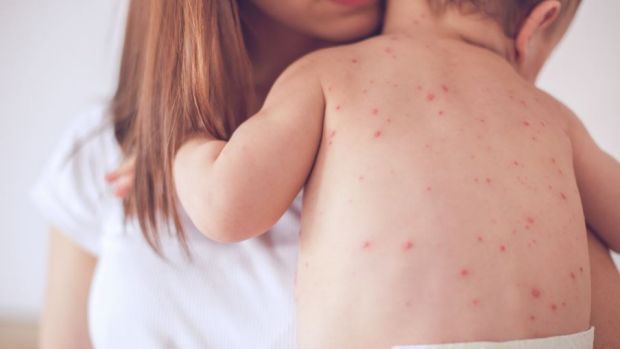
A Melbourne surgeon has warned that this week’s measles outbreak could be worse than reported after a mother sought medical advice about her infected baby on a secret, anti-vaccination social media page.
In a post on the private Facebook page Vaccine Free Australia, Natasha O’Leary reported her unvaccinated, 12-month-old son had measles and asked members for advice on how to treat highly contagious disease naturally.
Members responded with suggestions that she give him cod liver oil, homeopathic remedies, vitamin A and C supplements.
In the post, Ms O’Leary, who runs a hospitality business in Melbourne’s western suburbs, said she looked forward to a time “when we don’t need secret anti-vax groups!”.
John Cunningham, a Melbourne surgeon and spokesman for pro-vaccination group Stop the AVN, said failing to report suspected cases of measles to health authorities would expose other people to the virus.
“We know about four cases, this is now a fifth,” he said.
“It’s concerning that if people aren’t notifying their local doctor that cases might go unreported and the real instance is underestimated.”
Dr Cunningham said measles cases in Melbourne were likely to increase in the next few weeks and stressed the importance of seeking medical advice as well as alerting doctors about suspected cases before attending waiting rooms where there may be other susceptible people.
He said unvaccinated children who contracted the virus were more likely to be hospitalised, and that children who were too young for the vaccine would be at risk because of the “poor decisions” of some parents.
“The poor child is suffering now from a disease that has a 1 in 1000 risk of permanent brain damage from encephalitis, which is inflammation of the actual brain tissue,” he said.
“The rash that they get isn’t just on the skin, it goes through their lungs, through their gastrointestinal track.”
His comments follow a health department alert this week warning residents in Melbourne’s north to brace for wave of measles cases.
Officials said four people – a man and three women – had contracted the disease in the Brunswick area.
The state’s acting chief health officer Dr Roscoe Taylor said the number of patients could potentially “be very large”.
Victorian Health Department spokesman Graeme Walker said on Friday that the number of confirmed measles cases had not risen from four.
Despite Ms O’Leary’s suspicions that her son has the virus, Mr Walker said he did not believe measles cases associated with the current cluster had gone unreported to health authorities.
He said it was unlikely because Ms O’Leary lived in Melbourne’s west, about 10km from Brunswick.
“It seems to be fairly geographically located,” he said. “It’s drawing a fairly long bow there, as I said, we’ve got four cases in Brunswick and that’s all that we’ve got.”
When contacted by The Age, Ms O’Leary said she was taking her son to a GP on Friday afternoon and that the case had not yet been confirmed.
She said her son had “a bit of a rash” but was in good spirits and that she was not overly concerned because he was not lethargic or suffering from more severe symptoms.
“My children are third generation not vaccinated,” Ms O’Leary said.
“I’m not anti-vaccination, I’m just pro-transparency. I question anything when there’s big money involved.”
Ms O’Leary said she believed developing naturally immunity was best way to protect her children and that people should not be told what to put in their bodies.
“I think everyone should have the right to choose, the right to transparency and freedom,” she said.
“If it came down to being jailed I would be, this is how strongly I feel about it; the right of the parent to decide what poison to put in a child’s body.”
Ms O’Leary said her son had not been inside her hospitality business for weeks.
Measles is a virus that lives in the nose and throat mucus of an infected person and spreads through coughing and sneezing. Symptoms include fever, sore throat, red eyes, coughing and the characteristic measles rash.
Children who have not had two measles vaccinations are among the most at risk of contracting the virus.
The measles vaccine is part of the National Immunisation Program for children between 12 months and four years of age.
A community’s immunisation rate has to be about 90 per cent for what is known as ‘herd immunity’ to kick in, according to the National Centre for Immunisation Research and Surveillance.
